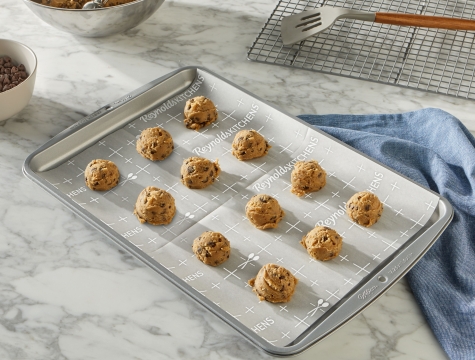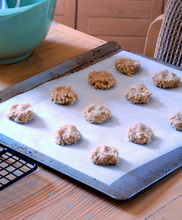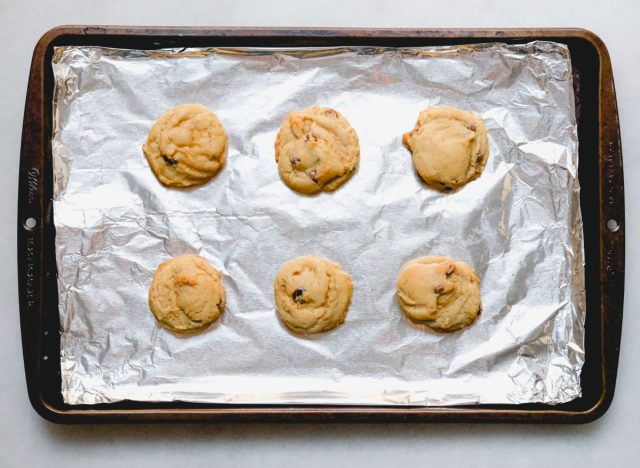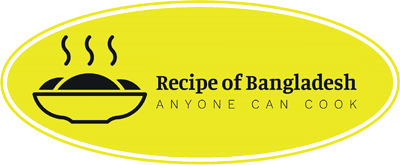Have you ever found yourself in the kitchen, ready to bake a batch of your favorite cookies, only to realize you’re out of baking sheets? You might start wondering, “Can you bake cookies on just parchment paper?”
This question is more common than you think, and the answer might surprise you. Imagine the aroma of freshly baked cookies wafting through your home, all while using a simple trick that could save you time and hassle. Before you reach for that non-stick spray or aluminum foil, let’s dive into the role parchment paper plays in baking and whether it can truly stand alone.
Keep reading to uncover the secrets of parchment paper and how it can become your new best friend in the kitchen. Your future cookie adventures might just get a whole lot simpler.
Basics Of Baking With Parchment Paper
Baking with parchment paper is a simple and effective technique. It offers a non-stick surface that makes baking easier. No need for greasing pans or worrying about cookies sticking. This method provides even heat distribution, ensuring perfect cookies every time. Let’s explore the basics of baking with parchment paper.
What Is Parchment Paper?
Parchment paper is a silicone-coated paper. It’s heat-resistant and non-stick. This makes it ideal for baking. It can withstand temperatures up to 450°F. It’s an essential tool for bakers.
Parchment paper prevents sticking. It makes cleanup easy. It also allows for even baking. Cookies brown evenly without burning. It helps maintain the perfect cookie shape.
How To Use Parchment Paper For Baking
Place the parchment paper on a baking sheet. Ensure it’s flat and covers the entire surface. Arrange cookie dough on the paper. Leave space between cookies for spreading.
Common Mistakes To Avoid
Don’t use wax paper as a substitute. It’s not heat-resistant and can melt. Avoid reusing parchment paper too many times. It loses its non-stick quality with each use.
Environmental Impact
Parchment paper is biodegradable. It’s a better choice than aluminum foil. Ensure it’s discarded properly after use. Some brands offer compostable options.

Credit: www.reynoldsbrands.com
Benefits Of Using Parchment Paper
Baking cookies on parchment paper ensures even cooking and easy cleanup. It prevents sticking, making the cookies perfect. The non-stick surface eliminates the need for additional grease, maintaining the texture and taste.
When you bake cookies, parchment paper can be your best friend in the kitchen. It offers a range of benefits that make the baking process smoother and more enjoyable. Whether you’re a baking novice or a seasoned pro, understanding these benefits can enhance your baking experience and lead to better results.
Non-stick Surface
Parchment paper provides a non-stick surface that prevents cookies from sticking to the baking sheet. This means you can easily remove your cookies without them breaking apart. Have you ever had a batch of cookies ruined because they stuck to the pan? With parchment paper, you can say goodbye to that frustration.
Even Heat Distribution
Using parchment paper helps distribute heat evenly across the baking sheet. This ensures that your cookies bake consistently, with no over-browned edges or undercooked centers. Imagine the satisfaction of pulling out a perfectly baked batch, where each cookie is as delightful as the next.
Easy Cleanup
Baking is fun, but cleaning up can be a chore. Parchment paper minimizes mess by keeping your baking sheets clean. Simply discard the paper after baking, and enjoy more time savoring your cookies and less time scrubbing pans. Parchment paper is a simple tool that elevates your baking. Have you tried it yet? It might just become your new favorite kitchen hack.
How To Prepare Your Baking Sheet
Parchment paper works well for baking cookies, offering a non-stick surface. It ensures easy cleanup and even baking. Just place it on the baking sheet, and your cookies will bake perfectly without sticking.
Preparing your baking sheet is like setting the stage for the perfect cookie performance. You might wonder if you can skip the fuss and bake directly on parchment paper. The answer is yes, but there’s more to it than just placing cookies on a sheet. Proper preparation can make all the difference between a cookie that’s baked to perfection and one that’s a bit of a flop. Let’s dive into the essentials of choosing the right parchment paper and positioning it on the baking tray.
Choosing The Right Parchment Paper
Not all parchment paper is created equal. You want something sturdy that won’t curl up in the oven. Look for parchment paper that’s heat-resistant up to 450°F or more. This ensures it won’t burn or smoke during baking. Consider pre-cut sheets for convenience, especially if you bake often. They save time and fit snugly on your tray.
Positioning On The Baking Tray
Positioning the parchment paper properly can make your baking experience smoother. Make sure the parchment covers the entire tray without any gaps or folds. This prevents cookies from sticking or sliding off the sheet. If your tray is larger than the parchment, overlap pieces slightly to ensure full coverage. Have you ever baked cookies, only to find them unevenly cooked? This could be due to improper positioning. Ensuring the parchment lies flat helps cookies bake evenly. With these simple steps, you’re setting yourself up for cookie success. The next time you bake, think about how a well-prepared baking sheet could transform your results.

Credit: bakingbites.com
Step-by-step Baking Process
Baking cookies on parchment paper is simple and effective. Parchment paper prevents sticking and ensures even baking. It offers a clean surface, making cookie removal easy without added oils.
Baking cookies is a delightful experience that fills your home with warmth and sweet aromas. But can you bake cookies on just parchment paper? Absolutely! This step-by-step guide will walk you through the process, ensuring your cookies turn out perfectly baked every time. You don’t need fancy equipment—just parchment paper, an oven, and your favorite cookie dough.
Preheating The Oven
Start by setting your oven to the required temperature. Most cookie recipes suggest 350°F (175°C), but always check your specific recipe. Preheating is crucial because it ensures an even bake from the moment your cookies hit the heat. You might wonder why preheating is so important. An oven that’s too cool can lead to cookies spreading too much. On the other hand, an oven that’s too hot can cause them to brown too quickly.
Placing The Dough
Once the oven is ready, it’s time to place your cookie dough on the parchment paper. Lay the parchment paper on a baking sheet, ensuring it’s flat and wrinkle-free. Use a tablespoon or a cookie scoop to drop dough balls onto the paper. Leave about 2 inches between each ball to allow for spreading. Pressing the dough slightly can help achieve that perfect cookie shape. Have you ever had cookies merge into one giant blob? This spacing is your best defense against that!
Monitoring Baking Time
Place the baking sheet in the oven and set a timer according to your recipe—usually between 8 to 12 minutes. Keep a close eye on your cookies as they bake. The edges should be slightly golden while the centers remain soft. Sometimes, even a minute can make a big difference in achieving that perfect texture. Consider rotating the baking sheet halfway through for an even bake.
This simple step can prevent uneven browning, especially if your oven has hot spots. Have you ever had cookies that were burnt on one side? Rotating can help avoid that disappointment. Baking cookies on just parchment paper is not only possible but also incredibly convenient. It simplifies the cleanup process and ensures an even bake. So, next time you’re in the mood for cookies, skip the fancy gadgets and go for parchment paper!
Common Mistakes And How To Avoid Them
Baking cookies on parchment paper is convenient and effective. Yet, common mistakes can impact the final result. Understanding these errors and knowing how to avoid them will help achieve perfect cookies every time.
Overcrowding The Tray
Placing too many cookies on a single tray is tempting. This mistake leads to uneven baking. Cookies need space to spread evenly. A crowded tray can cause cookies to merge together. Always leave enough space between each cookie. This ensures they bake properly and keeps their shape intact.
Incorrect Oven Temperature
Oven temperature plays a crucial role in baking cookies. Setting the wrong temperature can ruin the batch. Too high can result in burnt edges and a raw center. Too low can lead to undercooked cookies. Always preheat the oven to the recommended temperature. Use an oven thermometer to check accuracy. This guarantees consistent baking results.
Alternative Uses For Parchment Paper
Parchment paper is not just for baking cookies. It has many other uses in the kitchen. This versatile paper can save time and effort.
Roasting Vegetables
Roasting vegetables on parchment paper is easy. The paper prevents sticking and burning. It also makes cleaning quick and simple.
Arrange your vegetables on the paper. Add your favorite spices and a little oil. Then roast in the oven. The result is delicious and evenly cooked veggies.
Making Crispy Snacks
Parchment paper helps create crispy snacks. Use it for baking chips or crackers. It ensures even cooking and crispiness.
Spread your snack on the paper. Bake until golden and crunchy. No sticking, and perfect texture every time.
Tips For Perfect Cookies Every Time
Baking cookies directly on parchment paper might seem like a simple idea, but with the right tips, you can achieve cookie perfection every time. Imagine pulling out a tray of cookies that are evenly baked, perfectly round, and packed with flavor. This can be your reality with a few key tips. Whether you’re a novice baker or a seasoned pro, understanding the nuances of dough selection, cooling, and storage can elevate your cookie game.
Choosing The Right Dough
Not all cookie doughs are created equal. Some are better suited for parchment paper baking than others. For instance, choose doughs that are less sticky and have a firm consistency. This ensures they hold their shape and bake evenly. You might experiment with different recipes, but remember to adjust the dough’s texture for optimal results. A dough that spreads too much can lead to thin, crispy cookies instead of soft, chewy ones. What’s your go-to dough consistency when baking?
Cooling And Storage Tips
Once your cookies are out of the oven, cooling them properly is crucial. Transfer them to a wire rack to cool completely. This prevents moisture buildup and ensures crisp bottoms. Think about how you store them too—airtight containers are your best friend. They keep cookies fresh and flavorful for days. But be cautious; mixing different cookie types can lead to flavor transfer. Do you have a special way to keep your cookies fresh longer?
These tips are designed to help you bake cookies that are not just good, but great. Every batch can be a success with just a few adjustments. As you experiment, you’ll find the perfect balance that works for you. Happy baking!

Credit: www.eatthis.com
Frequently Asked Questions
Can I Bake Cookies On Parchment Paper Only?
Yes, you can bake cookies on parchment paper. It prevents sticking and ensures even baking. It also makes cleanup easier and is heat-resistant. Simply line your baking sheet with parchment paper before placing the cookie dough. This method is convenient and popular among bakers for its efficiency.
Will Raw Cookie Dough Stick To Parchment Paper?
Raw cookie dough may slightly stick to parchment paper. The paper’s non-stick surface usually prevents major sticking issues. Ensure proper dough spacing to reduce sticking. Use a spatula to lift if needed. Parchment paper is ideal for baking cookies.
Can You Bake Directly On Parchment Paper?
Yes, you can bake directly on parchment paper. It prevents sticking and ensures easy cleanup. Parchment paper is heat-resistant and safe for oven use. Always check the temperature limit on the packaging for best results.
Does Baking On Parchment Paper Make A Difference?
Baking on parchment paper prevents sticking and ensures even cooking. It simplifies cleanup and preserves baking sheets. Using parchment paper improves the texture and appearance of baked goods. It provides a non-stick surface, reducing the need for extra oils or sprays.
Parchment paper enhances baking efficiency and results.
Final Words
Baking cookies on just parchment paper works well. It prevents sticking. Cookies come off easily. No mess to clean up. Parchment paper can handle high temperatures. It’s safe for baking. Great for both beginners and pros. Just place the dough on the sheet.
Bake as usual. Enjoy delicious cookies every time. Simple and effective. Remember, no need for extra greasing. Saves time and effort. Try it and see for yourself. Parchment paper makes baking easier. Perfect for every kitchen. Happy baking!

Leave a Reply